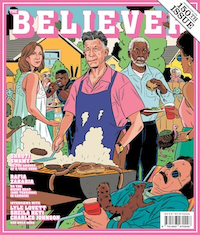Indonesian democrats have mixed feelings about Papua's independence drive
Stanley
To what extent has democratisation at the centre benefited Papua? When Habibie took over from Suharto, Papuans demanded that he give them what he gave East Timor, a choice for autonomy or independence. The new government under president Gus Dur tried to be more accommodating, for example by changing the name from Irian Jaya to Papua and sending home a lot of troops. He even gave a billion rupiah to Theys H Eluay to hold the Papuan People's Congress at the end of May 2000.
But if Gus Dur hoped this would dampen separatist demands he was wrong. The umbrella Papua Presidium Council (PDP) set up a militant Papuan Task Force (Satuan Tugas Papua) in many places. Its original purpose of preventing violence was soon buried under its own brutality towards non-Papuan settlers. These transmigrants are impoverished peasants from Java and Sulawesi and themselves victims of the New Order. Task Force members also demand money from business people and generally act thuggish. PDP leaders, meanwhile, take advantage of Papuan anti-Indonesian emotions in order to get themselves more gifts from the centre, for their personal use.
Unfortunately Papuans who interpreted Gus Dur's sympathy as a readiness to give them an independence option were also wrong. Papua was for Gus Dur just part of the political bargaining to retain power. Under pressure from parliament over alleged corruption, he said that if he was forced to resign, five Indonesian regions would secede - among them Papua.
The separatist issue, in other words, is a game for elites in Papua and in Jakarta. It has no significance for the great mass of Papuans.
As 'ethno-nationalism' grew and the PDP promised independence, economic envy led to clashes between indigenous Papuans and non-Papuan settlers, for example in Wamena in late 2000. Tensions also arose between highland and coastal people, with highlanders accusing coastals of dominating the PDP. Where nationalism should have been a force for democracy, PDP leaders turned it into an anti-democratic one with overtones of racial hatred, also among Papuans themselves.
The PDP leadership tried to accommodate popular feeling by forming the Penis Gourd Brigade (Pasukan Koteka) from Wamena to represent highlanders. Many of them flooded into Jayapura just before 1 December 2000, creating fresh tensions there. Non-Papuan settlers began to arm themselves - encouraged by the police chief. Hoping to prevent more trouble, the security forces took repressive action by arresting some PDP leaders on treason charges and bringing in more troops - a total of 12,000 of them. All this demonstrates a failure of democracy in Papua. Not to mention the many roadblocks and attacks on strategic economic assets.
Amidst this confusion, the media have thrown up many 'instant' leaders who might best be called democracy consumers, while the important figures of a real democracy movement in Papua are overlooked because they refuse to use primordial sentiments. Examples of such genuine democrats are Bishop Herman Munninghoff who fights military human rights abuse in the interior, Rev Herman Saud who campaigns against violence and discrimination, Agustinus Rumansara who works to strengthen civil society, Tom Beanal who pursues human rights violators and supports indigenous empowerment, and John Gluba Gebze who works to create clean government.
Nor do many Papuans get to hear much about important human rights institutions like the Jayapura Legal Aid Institute (LBH), the Papuan NGO Cooperative Forum (Foker LSM Papua) or Elsham Papua. People are as if transfixed by the PDP's promise of independence, even in the absence of a clear agenda to get there.
Suharto
The democratisers are overshadowed by the likes of Theys Eluay, Thaha Al Hamid, Don Flassy and Herman Awom, who in reality merely manipulate group sentiment for their personal ends. Their backgrounds make interesting reading. Theys Eluay was part of the Pepera council in 1969 that voted unanimously in favour of joining Indonesia. He was a provincial parliamentarian for several terms under Suharto. Thaha Al Hamid is a failed student and a failed administrator in a range of non-government organisations (NGOs). For the 1999 elections he campaigned with Adi Sasono on behalf of the Partai Daulat Rakyat, a party seriously stained by corruption allegations. Don Flassy, meanwhile, is the secretary of the provincial planning agency (Bappeda Irian Jaya) who failed to win the governorship.
Papuan nationalism has also turned several OPM guerrillas into popular heroes. What most people don't know is that they have now joined the National Liberation Army (Tentara Pembebasan Nasional, TPN), which has a dubious relationship with the Indonesian army.
So what do Indonesian democracy activists think about Papua? Most are quite ignorant, but some Jakarta NGOs like Elsam and Isai work with local NGOs to strengthen Papuan civil society. There are differences among these Indonesian activists. Older ones want Papuans to join them in a common struggle against injustice everywhere. Younger ones are more open and ready to support anything they feel is good for the Papuan people themselves, including a desire for independence.
Stanley is a journalist and a manager at Isai, the Institute for the Free Flow of Information (isai@isai.or.id).












